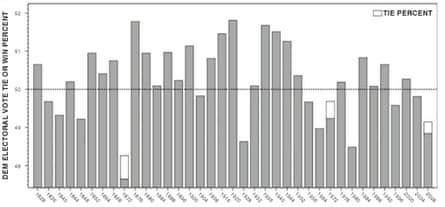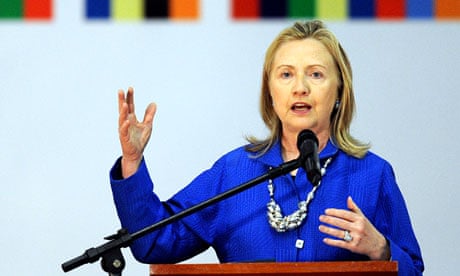President Obama won the 2012 presidential election by 3.9pt. He took the 2008 election by 7.3pt. Yet, these margins underestimated his true strength. United States presidential elections are decided in the electoral college. Obama gained an extra advantage there, but history and new polling suggests that the next Democratic nominee might not be able to hold it.
What do I mean by "extra advantage"? Obama won Colorado by a little less than 5.4pt in 2012, which is 1.5pt greater than his nationwide margin. If one had given every state Obama won by less than his margin in Colorado to Mitt Romney, Obama still would have won the electoral college by a 272-266 vote margin. That is, he won the "tipping point" state by a wider margin than the nationwide vote. Romney could have the national vote by a point, and he still would lost the election.
This could be a major problem for Republicans in upcoming elections. It would mean that they'd start off 1.5pt in the hole. The question is whether it will hold.
One could reasonably expect it to given that most states move the same percentage point to the right or left as the nation as a whole. So that as Obama lost 3.4pt off his nationwide margin in 2012, he lost, for example, 3.6pt off his margin in Colorado. Once you control for home state effect (eg John McCain did better in Arizona than a Republican from a different state would), over 97% of the differences in Obama's margin between states in 2012 is predicted by just knowing his margin between states in 2008.
The issue is that what is reasonable isn't always what is true. Check out this chart from Nicholas Miller. When the black bar ends above the middle line, the Democrats have a disadvantage in the electoral college relative to the national vote. When the black bar ends below the middle line, the Democrats have an advantage relative to the national vote.

It goes back and forth over time. If anything Republicans tend to do better in the electoral college than the national vote over the long haul. Over the past eight elections, however, Republicans have done better four times, while Democrats have done better four times (note that the chart was produced before the 2012 election).
How does current polling fit into this? Now, no one can expect that polling in 2013 to be too predictive of what will happen in 2016. President Obama's approval rating may rise or fall. Hillary Clinton's polling may rise or (most likely) fall to some degree. That said, there's likely a higher correlation between how states rise and fall relative to the national rise and fall than the overall swing. So if one state is showing worse (or better) numbers for Obama or Clinton now compared to nationally, it has a decent chance of holding.
That's why data from Colorado and Iowa could signal the end of the Democratic advantage in the electoral college. Colorado was, as mentioned, a tipping state with 9 electoral votes, while Iowa with 6 electoral votes has been slightly more Democratic than the nation as a whole.
Quinnipiac has conducted polls nationally and in both states recently. They looked at both Obama's job approval rating, and how Hillary Clinton is faring against potential GOP challenger Chris Christie. The polling from both of those states say the Democratic grip on them may be waning.

We see that President Obama's net approval rating is not great in the latest national Quinnipiac survey, but it's over 10pt worse in both Colorado and Iowa. We know that presidential approval rating does at least a somewhat decent job at predicting presidential elections, and in this case, it seems to be doing so for 2016.
Christie is running well ahead of where he is nationally in both Iowa and Colorado. Instead of trailing Clinton, he's either tied or in the lead. Again, the margins will change, but the point here is relative to the national vote, he's doing better than he is nationally.
Some might point out that polling in Colorado has a tendency to undershoot the Democratic candidate. That's true, though not to the extent that even if there were a bias here that it would erase the Republican lean compared to the national as a whole. We also have other polls from these states suggesting that it's not a one time phenomenon. More than that, these numbers make sense.
Iowa is chock full of whites without a college degree – the group that has abandoned Obama the most over the past few months. This, as I've noted, is part of a longer term trend. The state's voters are quite elastic in their voting choices per Nate Silver's index, which means that they would be more likely to shift harder to the right (or left) if there is a shift nationally.
Colorado doesn't have as many whites without a college degree, yet it's not the state that many think it is. It's actually whiter than the nation as a whole by 8pt, and its voters are more elastic. The voters there seem perturbed over new gun control laws. In addition, Clinton has always polled poorly in the west harkening back to her to 2008 run.
Thus, it seems that this polling data may very well be correct. If it is, then the historical trend will continue. The Democrats edge in the electoral college versus the national (popular) vote may not sustain itself through 2016.
